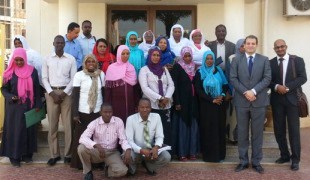The Max Planck Foundation conducted capacity building workshops for Legal Counsels of the Sudanese Ministry of Justice and Lawyers of the Sudanese Bar Union on Borders and Water Law over two weeks in November and December 2013, in Khartoum, Sudan
Following on from workshops on International Law in September 2013, the Max Planck Foundation for International Peace and the Rule of Law conducted two capacity building workshops for Legal Counsels of the Sudanese Ministry of Justice and Lawyers of the Sudanese Bar Union on Borders and Water Law.
Sudan and a few neighbouring States have thus far not been able to adequately agree on the delimitation of their respective borders, particularly with Egypt and South Sudan, each of which have areas of land that are disputed territories between these States. In addition to this, Sudan is a party to two treaties with Egypt that seek to regulate the use of shared water resources, namely those of the Nile river water. Especially due to competing claims by other Nile riparian States that seek access to the resources of the Nile these agreements have become very controversial.
The workshop introduced the participants to the regional and international legislative frameworks that regulate issues relating to delimitation and demarcation of borders, the use of maritime zones, and the equitable use of shared resources.
The main topics covered in the workshops included an introduction of the concept of sovereignty of States and the inviolability of borders, dispute resolution and border conflicts, law of the sea and borders, Sudan and its borders (with Egypt and with South Sudan) and transboundary cooperation between Sudan and South Sudan as outlined in the Addis Ababa Agreements of 2011–2012. On the last two days, the topics of principles of customary international law, the right to water in terms of groundwater and shared resources, dispute resolution and water, the Nile water treaties, and the Nile basin initiative were addressed. The workshops, although highly political in context, focused on the legal aspects surrounding each topic by constant reference to the legal framework governing the legal problems at hand. On the last day of both workshops, the participants were split into working groups and were presented with problem questions regarding the two Nile Water treaties of 1929 and 1959 and were asked to provide arguments justifying if and why Sudan and South Sudan were, respectively, bound by either or both treaties, and whether, and to what extent, the other riparian States were affected by the two treaties.
The workshops were funded by the German Foreign Office, supported by the two institutions. They took place in the training halls of the Ministry of Justice building and the Sudanese Bar Union, respectively.

